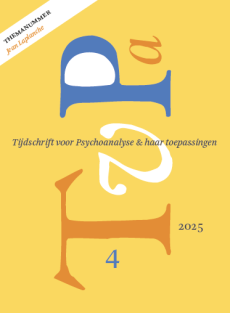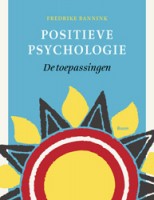Alice in Wonderland revisited
Samenvatting
The dream-child moving through a land
Of wonders wild and new,
In friendly chat with bird or beast
And half believe it true
(Alices adventures in Wonderland, Lewis Carroll)
Literatuur
- Anthony, J. (1981). The paranoid adolescent as viewed through psychoanalysis. Journal of the American Psychoanalytic Association, 29, 745-787.
- Arbisio-Lesourd, C. (1997). Lenfant de la période de latence. Parijs: Dunod.
- Berger, M. (1996). Les troubles du développement cognitif. Parijs: Dunod.
- Bergler, E. & Roheim, G. (1946). The psychology of time perception. Psychoanalytic Quarterly, 15, 190-206.
- Bion, W.R. (1962a). Learning from experience. Londen: Karnac.
- Bion, W.R. (1962b). The psycho-analytic study of thinking. International Journal of Psychoanalysis, 43, 306-310.
- Boimare, S. (1999). Lenfant et la peur dapprendre. Parijs: Dunod.
- Botella, C. & S. (2001). Figurabilité et régrédience. 61ième Congrès des psychanalystes de langue française. Parijs, 2001.
- Burke, K. (1963). The thinking of the body Comments on the imagery of catharsis in literature. Psychoanalytic review, 50C, 25-68.
- Carroll, Lewis (1865). Alice in Wonderland. Londen: Bantam Classic Books.
- Carroll, Lewis (1871). Through the looking glass. Londen: Bantam Classic Books.
- De Lantsheere, b. (1995). Hamlet et Humpty Dumpty. Revue Belge de Psychanalyse, no. 27. Flagey, D. (2002). Mal à penser, mal à être. Parijs: Érès.
- Franckx, C. (2003). Quand apprendre nest pas simplement plaisir. Revue Belge de Psychanalyse, no. 42, 25-41.
- Freud, S. (1900). De droomduiding. Werken 2. Amsterdam: Boom.
- Greenacre, Ph. (1955). Swift and Carroll A psychoanalytic study of two lives. New York: International Universities Press.
- Keller, E.F. (1980). Lewis Carroll A study of mathematical inhibition. Journal of the American Psychoanalytic Association, 28, 133-160.
- Mayes, L. (1991). Exploring internal and external worlds Reflections on being curious. Psychoanalytic Study of the Child, 46, 3-36.
- Solomon, J. (1963). Alice and the Red King The psycho-analytic view of existence. International Journal of Psychoanalysis, 44, 63-73.
- Tisseron, S. (2006). Lenfant au risque du virtuel. Parijs: Dunod.
- Vereecken, P. (1981). Linhibition des fonctions du Moi et la théorie psychanalytique de lacalculie. Psychiatrie de lEnfant, 24.
- Wilson, R. (2008). Lewis Carroll in Numberland. Londen: Allen Lane, Penguin Books.
- Winnicott, D. (1956). Primary maternal preoccupation. In D. Winnicott, Collected Papers (p. 300-305). Londen: Tavistock, 1958.
 © 2009-2026 Uitgeverij Boom Amsterdam
© 2009-2026 Uitgeverij Boom Amsterdam
ISSN 1382-516x
De artikelen uit de (online)tijdschriften van Uitgeverij Boom zijn auteursrechtelijk beschermd. U kunt er natuurlijk uit citeren (voorzien van een bronvermelding) maar voor reproductie in welke vorm dan ook moet toestemming aan de uitgever worden gevraagd:
Behoudens de in of krachtens de Auteurswet van 1912 gestelde uitzonderingen mag niets uit deze uitgave worden verveelvoudigd, opgeslagen in een geautomatiseerd gegevensbestand, of openbaar gemaakt, in enige vorm of op enige wijze, hetzij elektronisch, mechanisch door fotokopieën, opnamen of enig andere manier, zonder voorafgaande schriftelijke toestemming van de uitgever.
Voor zover het maken van kopieën uit deze uitgave is toegestaan op grond van artikelen 16h t/m 16m Auteurswet 1912 jo. Besluit van 27 november 2002, Stb 575, dient men de daarvoor wettelijk verschuldigde vergoeding te voldoen aan de Stichting Reprorecht te Hoofddorp (postbus 3060, 2130 KB, www.reprorecht.nl) of contact op te nemen met de uitgever voor het treffen van een rechtstreekse regeling in de zin van art. 16l, vijfde lid, Auteurswet 1912.
Voor het overnemen van gedeelte(n) uit deze uitgave in bloemlezingen, readers en andere compilatiewerken (artikel 16, Auteurswet 1912) kan men zich wenden tot de Stichting PRO (Stichting Publicatie- en Reproductierechten, postbus 3060, 2130 KB Hoofddorp, www.cedar.nl/pro).
No part of this book may be reproduced in any way whatsoever without the written permission of the publisher.
Nieuwsbrief Boom Psychologie
Meld u nu aan en ontvang maandelijks de Boom Psychologie nieuwsbrief met aantrekkelijke aanbiedingen en de nieuwe uitgaven.
Aanmelden


